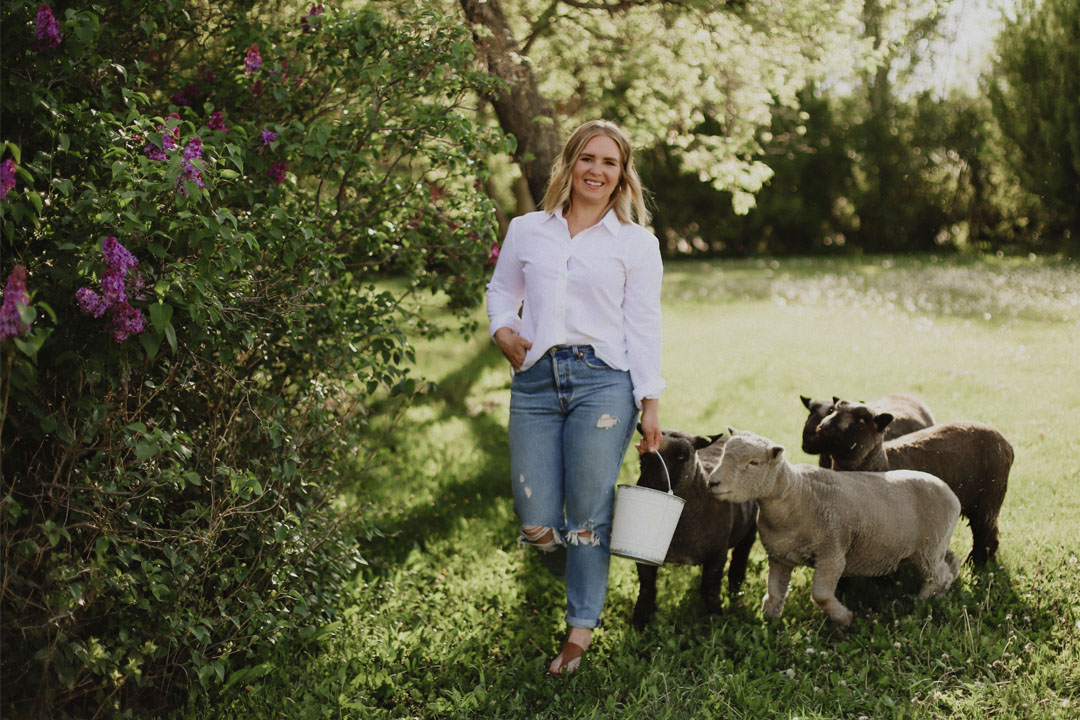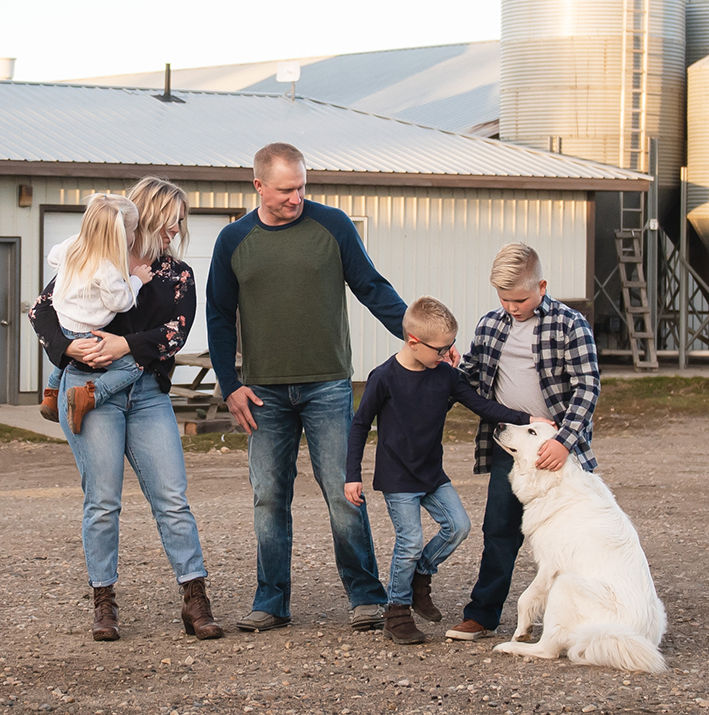
Supporting farm and family
Alumna Tiffany Martinka switched lanes from a corporate agriculture career to advocacy.
By Joanne PaulsonTo say Tiffany Martinka’s life is all about farming is both an understatement and not entirely true.
There is one thing more important, and that is family.
Martinka plunged into an agribusiness career after graduating from the College of Agriculture and Bioresources in 2008. But when her daughter was born four years ago with a rare form of epilepsy, she knew she would stay at home on the farm full-time.
“At six months of age, she had her first seizure,” Martinka said in an interview. “She was ultimately diagnosed with a severe form of epilepsy called Dravet syndrome.”
“I was coming up to the end of my mat leave and her seizures were nowhere near controlled. Being in rural Saskatchewan, there are not a lot of options for childcare, let alone special needs childcare.”
“I had to quit my career to stay at home on the farm to care for her. That was four years ago in November that I officially quit my job.”
Yet when a door closes, a window opens. When she was working full-time and raising her two older children, now 10 and seven, it left little time for her other passion: farm advocacy. Now home with her daughter at her side, she has been able to embrace it.
Martinka and her husband, Lane, operate a chicken farm in northeastern Saskatchewan near St. Benedict. One of 68 chicken farms in Saskatchewan, it produces 100,000 chicks per flock and six to seven flocks per year; they also seed 2,000 acres of grainland.
“My husband grew up here; this is the family farm my husband grew up on. I actually grew up in Weyburn. I met my husband in university; he was getting his agronomy degree. We settled close to the farm and then we had a five-year succession plan with my father-in-law. It’s been seven years since we transitioned.”
“We were farming with two uncles and we’re now 50-50 partners with an aunt and uncle, Laverne and Colleen Martinka.”
Marinka also grew up on a grain and cattle farm and was very involved with the family operation and in 4-H. Early on, she knew her career would be in agriculture.
“The reason I wanted to go into agriculture was because I knew that we all need agriculture in our lives every day . . . in every part of the world. At that age, I didn’t know where I would end up. I thought maybe I would travel, and I wanted to go into an industry where that might be possible.”
“I didn’t know exactly what job I wanted to do, but I knew the possibilities would be endless. Because we all need to eat, right? It’s such a diverse industry and that’s what led me to agriculture.”
She enrolled in the College of Agriculture and Bioresources, starting in economics; but she graduated with a degree in agribusiness, a specialty created by the college when she was in her second year.
“I was really interested in marketing and the business side of things. It was such a great program; I really enjoyed it. I really enjoyed the mixture of commerce classes as well as the agriculture classes.”
After graduation, she worked for the Canola Council of Canada as an agronomy specialist and then for Monsanto as a territory account manager.
Now, “my special needs daughter is my primary role,” she said. “Advocating and sharing our farm is something we can do right here; she can do it with me, alongside me.”

Advocating for agriculture
She started an Instagram account called Prairie Pretty, began writing a blog, and worked to expand her advocacy horizons.
“I started looking at opportunities I could do as a farmer . . . and participated in the Chicken Farmers of Canada young farmer program. I was one of five chicken farmers chosen from across Canada to participate . . . and being part of this program, I was able to travel to Ottawa, learn a lot more in-depth about our chicken industry . . . and that has really helped with my advocacy.”
“I started doing more advocating on my Instagram account. It’s really gotten a good amount of traction. I work closely with Farm and Food Care Saskatchewan, and I work closely with Chicken Farmers of Saskatchewan (CFS) and Chicken Farmers of Canada.”
She now serves as the CFS director for Farm and Food Care after being awarded its champion award in 2020. Martinka has also given presentations to a Dieticians of Canada conference, to parliamentary interns from Ottawa, and a Federal Municipalities of Canada conference.
Being home on the farm has allowed her to pursue other opportunities, and one of them has been thoroughly embraced by her children. She recently started managing a small flock of Olde English Southdown “Babydoll” sheep. They stand a mere 24 inches high at the shoulder.
“I wanted to get animals for the kids and decided on sheep,” she said. “I looked on Kijiji and thought, oh my gosh, that is what we need.”
She sourced the very rare little animals from a breeder who was retiring and dispersing her flock. Martinka took half of it; she now has 15 breeding animals and sells the lambs.
“It’s a niche market for these sheep. They are primarily used for hobby farms and acreages as pets and to eat the grass around acreages as well as used for someone to keep for spinning their own wool.”
The importance of connection
Her passions spring from a desire to connect farming with the rest of society.
“I want consumers to have a connection to their farmers,” she said. “In past generations, people used to grow up on the farm. Then the next generation they had grandma and grandpa to go visit on the farm. As generations go by, there’s less and less connection to that farm.”
“Now only three per cent of Canadians are involved directly in primary agriculture. That is not a lot of people. And farmers are often humble people who like keeping to themselves on the farm; there’s a reason why they like this lifestyle, so there’s even less of that three per cent that speak up about what we do.”
“It’s so important to offer that connection to the farm. People deserve to know where their food comes from.”
Among her other activities are virtual tours of her farm. During the pandemic, many people pivoted to using Zoom for meeting and connecting, and she took advantage of the online service.
“It was a way for me to offer virtual tours. Because of biosecurity reasons we can’t just walk everybody through our farm,” she noted.
“This past June, I offered a year-end virtual field trip for Saskatchewan classrooms. I presented to over 100 classrooms. It was so much fun; it was so neat to get that kind of response.”
“I think that demonstrates that there’s a need for this sort of information, this sort of connection.”
Agknowledge, Fall 2021

